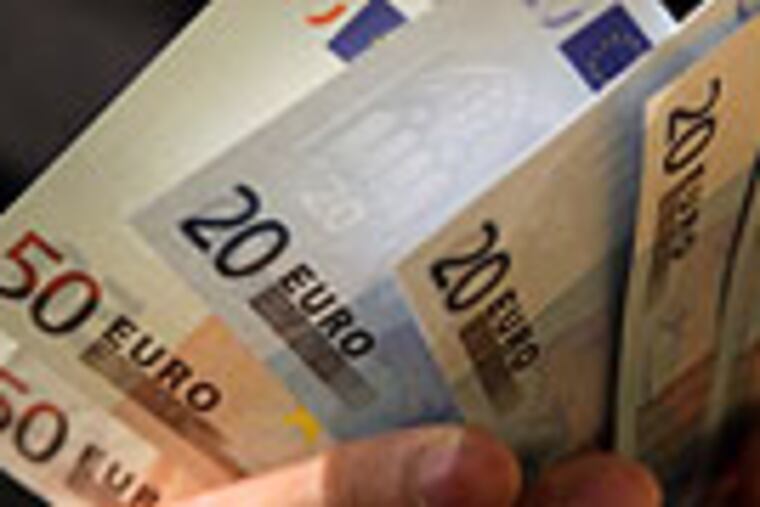Europe hurdles look even tougher in 2012
FRANKFURT, Germany - After a turbulent 2011, the 17 countries that use the euro will be quickly confronted in the new year with major hurdles to clear: solving their government-debt crisis just as the eurozone economy is expected to sink back into recession.

FRANKFURT, Germany - After a turbulent 2011, the 17 countries that use the euro will be quickly confronted in the new year with major hurdles to clear: solving their government-debt crisis just as the eurozone economy is expected to sink back into recession.
With government finances under pressure as growth wanes, the eurozone will find it even more difficult to shore up shaky banks and reduce the high borrowing costs that threaten Italy and Spain with financial ruin.
As early as the second full week of January, bond auctions in which Italy and Spain need to borrow big chunks of cash will start showing whether the eurozone is finally getting a grip on the two-year-old crisis that has seen Greece, Ireland, and Portugal bailed out.
If those auctions go well and borrowing costs ease, the crisis will ease, lending support for the European Union strategy of getting governments to embark on often-savage austerity measures to reduce deficits, along with massive support for the banking system from the European Central Bank.
High borrowing rates, on the other hand, would feed fears of a government debt default that could cripple banks, sink the economy, and, in the extreme case, destroy the 17-member currency union.
Among other key factors early in the new year:
The eurozone economy may slip into - or may prove to already be - in recession, lowering tax revenue and increasing government budget deficits.
Greece must agree with its creditors on a debt write-down that will cut the value of their holdings by 50 percent, in an effort to start putting the bankrupt country back on its feet.
The task is for the major players - the eurozone governments, the EU's executive commission, and the European Central Bank - to convince financial markets that troubled governments can pay their heavy debts and, therefore, deserve to borrow at affordable interest costs.
Default fears have driven up bond-market interest rates and made it more and more expensive for indebted governments to borrow to pay off maturing bonds. That vicious cycle forced Greece, Ireland, and Portugal to seek bailout loans from the other eurozone governments and the International Monetary Fund.
A stress point will be whether Italy can continue to raise money in the markets at affordable rates. In the first quarter, it has to step up its borrowing to pay off 72 billion euro ($94 billion) in bond redemptions and interest payments.
Spain, which is expected to sell up to 25 billion euro ($33 billion) in new debt, starts a heavy period of auctions Jan. 12. Italy begins Jan. 13.
Overall, Italy has more than 300 billion euro ($392 billion) in debt maturing in 2012.
"If Italy manages to auction this debt successfully, then the debt crisis will take a step back from the cliff edge," said analyst Jane Foley at Rabobank International in London. "If it doesn't, it could go over the cliff edge. At the end of the day, whatever the nuances and hours of discussion that have gone on about the sovereign-debt crisis, it boils down to whether a sovereign can sell its debt in the open market."
If Italy fails to borrow at affordable rates, the options are few and unattractive. The eurozone's 500 billion euro ($653 billion) in bailout funds - already partly committed to earlier bailouts - would struggle to cover Italy's financing needs, even if additional help could be found from the IMF.
A bigger solution - commonly guaranteed eurobonds - faces German resistance and would take time to implement.
The European Central Bank could use its power to buy large amounts of Italian and Spanish bonds with newly created money but has so far refused, out of concern that a central bank bailout would remove the incentive for governments to control their spending.
Instead, the bank has focused on pushing credit to banks so they can keep lending to support the economy.
Guntram Wolff, deputy director of the Bruegel think tank in Brussels, Belgium, said governments may get past the early hurdles, only to confront a souring mood among voters in the second half of the year over continuing cutbacks and sacrifices.
New governments in Spain and Italy, currently enjoying political honeymoons, will be pressed to show progress. Greece, with a transitional government and elections expected in April, has seen repeated protests and strikes.
"There will be a point in the summer when people have seen a lot of action from government and no improvement in their living conditions, and they will ask, 'Do we have this euro to live with austerity and high unemployment?' " he said.
Wolff thinks the determination of political elites to keep the euro together will win out: "I think it's going to survive."